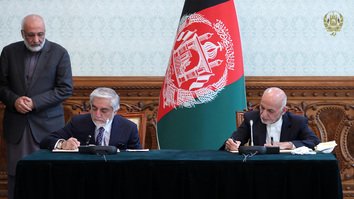KABUL -- Afghans reacted with a barrage of criticism after the Taliban Tuesday (September 7) announced the members of their caretaker government, which has top positions going to hardline Taliban leaders and no women, professionals or ethnic minorities included in the cabinet -- despite promises of a representative and diverse government.
Defiant Afghans staged rallies, protested through social media and expressed their dissatisfaction through interviews with media outlets.
Afghan women in particular expressed dismay and anger.
"Women account for half of the Afghan population, but the Taliban have not included any of them in their cabinet," said Masoma, a women's rights activist in Kabul.
"The absence of women in the Taliban cabinet means ignoring half the population," she said, adding that such a system will be unstable.
"Afghan women have struggled so hard over the past 20 years to achieve democracy, but the Taliban have destroyed everything since they seized power," said Mariam, a university student who attended a rally in Kabul to protest the Taliban's cabinet announcement.
Pointing to the omission of the Ministry of Women's Affairs, Mariam said, "This indicates that the Taliban intend to establish a dictatorship in which women have no share."
The Taliban want to monopolise power by ignoring the wider Afghan population, especially women, she said.
"We urge the international community not to forget Afghanistan and not to allow an extremist group to torture our people," she said.
Taliban's broken promises
The Taliban promised to establish an inclusive government, but all members of the caretaker cabinet are Taliban, said Ishaq Atmar, an Afghan political analyst in Germany.
"Everybody was astonished after the news of their announcement broke yesterday," he said Wednesday.
"This is exactly the opposite of what they have been reassuring the Afghan public and the international community," he said.
The Taliban's cabinet has neither inclusivity nor expertise and could endanger Afghanistan’s future, said Sayed Hakim Kamal, another political analyst in Germany.
The cabinet is not all-encompassing, he said.
On the contrary, power, the determination of cultural, political and economic values, the advancement of institutions and the country's affairs, and most important, political decision-making all have fallen into the hands of one particular group, he added.
The Taliban sidelined a large number of skilled professionals, especially those with experience and legislative ability, from key positions, Kamal said.
The group in power are all mullahs and clerics, many with extremist backgrounds, he said, adding that none of them knows anything about today’s global realities, sociology, philosophy, political science or psychology.
Expressing concern about the illegitimacy of the cabinet, Kamal warned of consequences to come like social disarray, riots and poverty.
Mounting challenges
Afghans will face great challenges under Taliban rule, said Ali Ahmad Ahmadi, a Kabul resident.
The Taliban are unlikely to receive international recognition, which would lead to the isolation of Afghanistan, and that could potentially affect the lives of many ordinary Afghans, he said.
The country already faces many problems, including government employees' unpaid salaries, the closure of the banking sector and the brain drain after Kabul fell, Ahmadi said.
This new government poses yet another major challenge that will be felt more in the coming months, he added.

![Taliban fighters stand guard along a road in Kabul September 9. [Wakil Kohsar/AFP]](/cnmi_st/images/2021/09/09/31594-000_9mg9vr-585_329.jpg)






